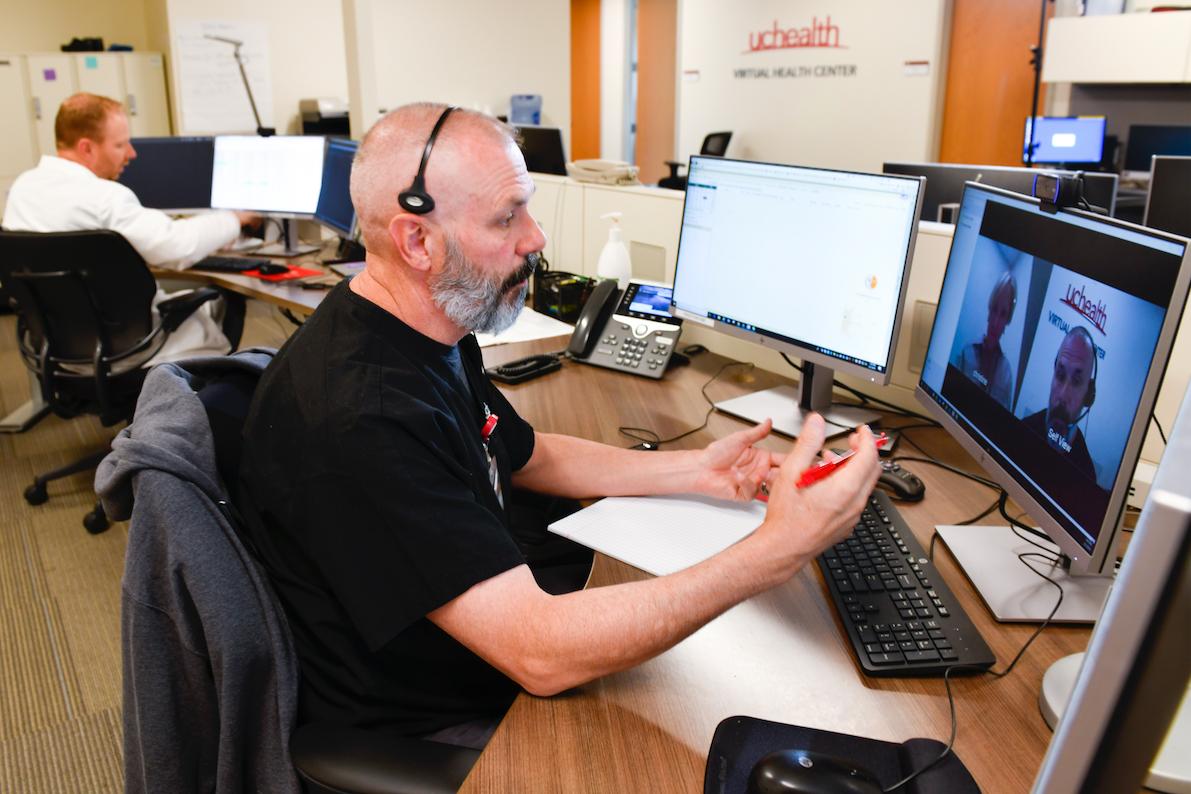
Five years ago, Patrick Gaines was diagnosed with a tumor in his spine. The quick onset paralyzed him from the neck down.
After an eight-hour surgery and months of physical therapy, Gaines was able to walk again, but he was diagnosed with complex regional pain syndrome, which meant he would live with intense pain for perhaps the rest of his life.
After he became addicted to prescription pain medication, like millions of other Americans, a doctor at UCHealth asked him about his life before the tumor and the surgery. Gaines had never been asked about his emotional and mental health before that.
“Most doctors are looking for something that they can fix,” he said. “He was the first one really to look and take that chance, and sorta say, ‘I know I’m trained in the anatomy of the body, but I also am very interested in a person’s resiliency, and their will to live, and their ability to face sometimes challenges that we can’t fix with our tool box.’”
To help people just like Gaines, UCHealth announced today that it will invest $100 million into its behavioral health services over the next five years.
UCHealth will integrate social workers and psychologists into its primary care practices, build out in-patient and out-patient behavioral health programs, and introduce tele-psychiatry to its smaller hospitals and ERs as well as its primary care locations.
Every three years, UCHealth performs a community health assessment by surveying patients and providers as well as partner community health organizations to better understand the needs of Coloradans. Behavioral health was the biggest need in the state by far, according to Dan Weaver, vice president of communications for the system.
The new initiative will focus on providing the right care at the right time for the most patients possible.
To provide appropriate behavioral health care at the right time, UCHealth with integrate behavioral health services into the primary care practice. That means when patients are at an appointment with their physician for their hypertension or diabetes, but they’re feeling depressed and anxious, the primary care provider can reach out to an in-house psychologist or licensed social worker who can evaluate patients for those needs all within the primary care office.
“One of the big benefits of treating patients in a primary care practice is you demystify and destigmatize mental health care,” said Dr. Neill Epperson, chair of the Department of Psychiatry at the University of Colorado School of Medicine on the Anschutz Medical Campus. “It helps the patient feel like ‘OK, I’m just getting my medical care, it just so happens to be for something that’s going on with my brain.’ We wouldn’t be feeling stigmatized if you had to go and get treatments for migraines.”
At some of the systems larger primary care facilities, this kind of integrated care has already been happening, Epperson said. But it will take time to bring the initiative to life throughout the system. The initiative will start in pilot primary care offices and then expand from there. Around 20 clinical social workers and psychologists will be hired in the next 18-months to meet the need of the initial pilot offices, said Weaver.
If the in-house behavioral health specialist thinks the patient could use further evaluation or they have a more complex behavioral health need, then tele-psychiatry can fill the need, Weaver said. A tele-psychiatrist can evaluate patients through a video-chat and make recommendations on medication or services for the patient without being in the office. The virtual health services will be rolled out in smaller hospitals and emergency rooms across the state as well.
While the push to bring integrated care to the whole system is new, it’s not the first time providers in the UCHealth system have taken steps to address the behavioral health needs of their patients.
Today, Gaines manages his considerable pain with a program that involves modifying his diet and using practices like meditation to manage the pain rather than fight it. He no longer uses prescription pain medication, and he doesn’t skip his check-ups or MRIs. The program was developed by his team of care practitioners, and that’s something he hopes other patients at UCHealth will get now.
“At UCHealth they so believe in the behavioral health wellness benefits and addressing it early on that I have an expectation for myself as a consumer that my behavioral and mental health needs are going to be addressed with the same seriousness and purpose as my physical health needs,” Gaines said.








